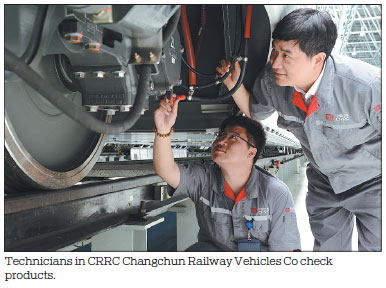Jilin cleaning up its act to save electricity and the environment

Jilin has promoted industrial energy conservation and cleaner production in recent years, local officials said. It aims to build a green manufacturing system and boost companies' green capabilities.
The province's 13 green factories, 17 green products and two green parks are included in national green manufacturing demonstration lists.
As a major energy-consuming company in Jilin, CRRC Changchun Railway Vehicles Co has tried to improve its energy use. The company saved about 2,000 metric tons of steam and about 500,000 kilowatt-hours of electricity last year.
Sheng Ligang, deputy head of the company's security department, said that since the company launched the green system in 2017, it emphasized the construction of green plants and dared to reform energetic management and technology.
On emission reduction, boiler rooms use low-sulfur coal to cut emissions of sulfur dioxide, Sheng added.
Officials from the Jilin industry and information technology department said that Jilin will further develop the green manufacturing system and implement national policies. The province will promote saving and full use of industrial resources to reduce industrial energy and material consumption, they said.
Another company in Jilin produces plastic bags made of corn. The bags are used by KFC and McDonald's.
Jilin COFCO Biological Material Co is located in the biological industrial park of the Changchun Economic and Technological Development Zone.
On its product line, fermented corn and polymerization produces the raw material of polylactic acid. It then goes through a pelletizer, film blowing machines and finally into bag machines. Degradable plastic bags are produced this way.
Guan Yang, general manager at the company's quality control department, said that as they use corn as a raw material, the company constantly receives polylactic acid product orders. It mainly produces plastic bags, agricultural plastic mulching films, disposable foam tableware and porcelain-like tableware.
As a leading enterprise in its industry, Guan's company has long persisted in sustainable and green development. It is an example of Jilin's manufacturers finding out how to develop in a green way.
Wang Haiyi, deputy general manager, said: "The company has invested nearly 300 million yuan ($44.6 million) and made a key breakthrough with the production line, which makes 30,000 tons of polylactic acid products annually."
Wang said the company gradually found a replicable mode of green manufacturing.
Automobile maker SFTM Changchun Fengyue also has impressive stories of environmental protection. Its sewage treatment works is different from traditional ones as dozens of koi carp swim in the monitoring pool for terminal sewage disposal.
Zhong Shi, an executive from the company's production management department, said the fish mainly monitor water quality. The works can treat 1,800 tons of sewage every day. The company now disposes about 1,000 tons of sewage daily and 300 tons of it is reused.
The company has taken measures such as promoting energy conservation and emission reduction and organizing environmental protection events to implant green concepts into every corner of the plant.
Jilin will focus on traditional industries such as food, metallurgy, building materials and energy to carry out upgrades for green development in the next three years, Beijing-based China Industry News reported in August. The province aims to convert traditional industry to a new green industry system.
Its food sector will mainly lead corn-processing enterprises to realize sustainable development. Other priorities include building modern food supply chains featuring product traceability.
It will help the improvement of saline-alkali soil in western Jilin and support deep processing of weak base food.
The metallurgy sector will promote the use of efficient and energy-saving products. This includes high-strength steel for developing vehicles and die steel for advanced equipment manufacture.
It will develop high-performance aluminum magnesium alloy and encourage industries of nonferrous metals involving nickel, magnesium, molybdenum and gold.
The building materials sector will play an important role. It will support the reuse of urban construction and industrial wastes, the restructuring of cement companies and upgrading of glass and wall materials.

MOST POPULAR
- 1 China to give visa-free treatment to another 9 countries
- 2 China fully opens manufacturing sector to foreign investors in landmark opening up move
- 3 China's import expo attracts record-breaking participating countries, exhibitors
- 4 China's door opening even wider to foreign visitors, businesses
- 5 China revises rules to ease foreign strategic investment in listed firms
Editors' Picks
 Video:
Peru sees new port open
Video:
Peru sees new port open
 Infographic:
China's public holidays for 2025
Infographic:
China's public holidays for 2025
 Infographic:
Basic facts of APEC
Infographic:
Basic facts of APEC
 Infographic:
Wrapping up the 7th CIIE: Data recap
Infographic:
Wrapping up the 7th CIIE: Data recap



